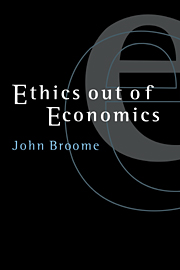1 - Introduction: ethics out of economics
Published online by Cambridge University Press: 12 November 2009
Summary
Economics and ethics
The traffic between economics and ethics travels in both directions. Each discipline can learn from the other. Economics is partly concerned with assessing the merits of economic arrangements, and with deciding how governments ought to conduct their economic affairs. It makes judgements of right and wrong, good and bad, in economic matters. It needs criteria for making these judgements, and the criteria must come from ethics. On the other hand, economists have developed for their own purposes sophisticated methods of analysis that turn out to be useful in philosophical ethics. They can help not only with questions of practical ethics, but also with fundamental issues in ethical theory.
This book concentrates on just one of the areas where the methods of economics can contribute to ethics. It is about those problems in ethics that require us to balance different interests or concerns against each other. For example, we have to balance the interests of future people against the interests of presently living people, fun in retirement against fun in youth, the wellbeing of the deprived against the wellbeing of the successful or lucky, the value of prolonging people's lives against the value of making people's lives better while they last. Many of these are problems of large-scale or public morality – problems for politics and the institutions of society. Weighing the prolonging of lives against the improving of lives is a pressing issue for the health service, for instance. How should the health service value hip replacements, which improve lives, compared with heart replacements, which prolong them? What importance should it give to palliative care, which does nothing to prolong lives, and may even shorten them?
- Type
- Chapter
- Information
- Ethics out of Economics , pp. 1 - 16Publisher: Cambridge University PressPrint publication year: 1999



